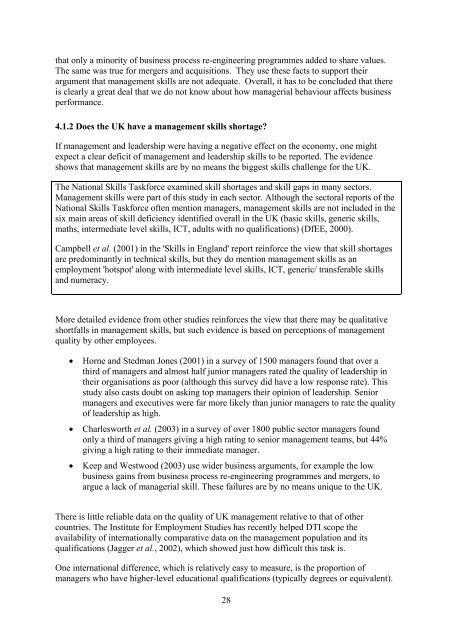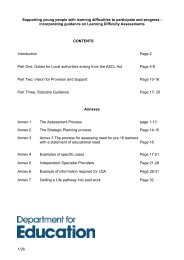The Development of Management and Leadership Capability and its ...
The Development of Management and Leadership Capability and its ...
The Development of Management and Leadership Capability and its ...
Create successful ePaper yourself
Turn your PDF publications into a flip-book with our unique Google optimized e-Paper software.
that only a minority <strong>of</strong> business process re-engineering programmes added to share values.<br />
<strong>The</strong> same was true for mergers <strong>and</strong> acquisitions. <strong>The</strong>y use these facts to support their<br />
argument that management skills are not adequate. Overall, it has to be concluded that there<br />
is clearly a great deal that we do not know about how managerial behaviour affects business<br />
performance.<br />
4.1.2 Does the UK have a management skills shortage?<br />
If management <strong>and</strong> leadership were having a negative effect on the economy, one might<br />
expect a clear deficit <strong>of</strong> management <strong>and</strong> leadership skills to be reported. <strong>The</strong> evidence<br />
shows that management skills are by no means the biggest skills challenge for the UK.<br />
<strong>The</strong> National Skills Taskforce examined skill shortages <strong>and</strong> skill gaps in many sectors.<br />
<strong>Management</strong> skills were part <strong>of</strong> this study in each sector. Although the sectoral reports <strong>of</strong> the<br />
National Skills Taskforce <strong>of</strong>ten mention managers, management skills are not included in the<br />
six main areas <strong>of</strong> skill deficiency identified overall in the UK (basic skills, generic skills,<br />
maths, intermediate level skills, ICT, adults with no qualifications) (DfEE, 2000).<br />
Campbell et al. (2001) in the 'Skills in Engl<strong>and</strong>' report reinforce the view that skill shortages<br />
are predominantly in technical skills, but they do mention management skills as an<br />
employment 'hotspot' along with intermediate level skills, ICT, generic/ transferable skills<br />
<strong>and</strong> numeracy.<br />
More detailed evidence from other studies reinforces the view that there may be qualitative<br />
shortfalls in management skills, but such evidence is based on perceptions <strong>of</strong> management<br />
quality by other employees.<br />
• Horne <strong>and</strong> Stedman Jones (2001) in a survey <strong>of</strong> 1500 managers found that over a<br />
third <strong>of</strong> managers <strong>and</strong> almost half junior managers rated the quality <strong>of</strong> leadership in<br />
their organisations as poor (although this survey did have a low response rate). This<br />
study also casts doubt on asking top managers their opinion <strong>of</strong> leadership. Senior<br />
managers <strong>and</strong> executives were far more likely than junior managers to rate the quality<br />
<strong>of</strong> leadership as high.<br />
• Charlesworth et al. (2003) in a survey <strong>of</strong> over 1800 public sector managers found<br />
only a third <strong>of</strong> managers giving a high rating to senior management teams, but 44%<br />
giving a high rating to their immediate manager.<br />
• Keep <strong>and</strong> Westwood (2003) use wider business arguments, for example the low<br />
business gains from business process re-engineering programmes <strong>and</strong> mergers, to<br />
argue a lack <strong>of</strong> managerial skill. <strong>The</strong>se failures are by no means unique to the UK.<br />
<strong>The</strong>re is little reliable data on the quality <strong>of</strong> UK management relative to that <strong>of</strong> other<br />
countries. <strong>The</strong> Institute for Employment Studies has recently helped DTI scope the<br />
availability <strong>of</strong> internationally comparative data on the management population <strong>and</strong> <strong>its</strong><br />
qualifications (Jagger et al., 2002), which showed just how difficult this task is.<br />
One international difference, which is relatively easy to measure, is the proportion <strong>of</strong><br />
managers who have higher-level educational qualifications (typically degrees or equivalent).<br />
28
















